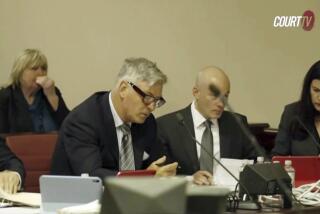Political Parallels in the Process of Choosing a Jury
- Share via
At a panel discussion of the O.J. Simpson case Thursday, defense attorney Johnnie L. Cochran Jr. said he wants the jury to reflect Los Angeles’ racial and economic diversity.
“We don’t want all wealthy, retired people on the jury,” Cochran told members of the Public Relations Society of America’s Los Angeles chapter. “We want a cross-section of this community.”
That is why the defense is so opposed to the prosecution’s efforts to sequester the jurors, separating them from the rest of the population during the trial by forcing them to stay in hotel rooms at night and herding them to and from the courtroom as if they were prisoners.
“Who in this audience would like to spend six months away from their families, locked up with 11 other strangers?” asked Cochran. “Retired people who don’t like their families.”
Cochran’s words were revealing. They explained the dynamics of what will happen in Judge Lance A. Ito’s courtroom when jury selection begins Monday in the trial of O.J. Simpson in the murder of his ex-wife, Nicole Brown Simpson, and her friend, Ronald Lyle Goldman.
*
Jury selection is a lot like the last stages of a political campaign, when candidates and parties labor to get favorable voters to the polls.
Think of the prosecution as the Republicans.
Republicans hope for a small turnout, limited to the most dedicated voters, those who will brave rain and gridlock to vote--or who are so well-organized and sophisticated that they go through the procedures required to vote by mail.
Studies show that this type of voter tends to be older, better educated and more affluent. In other words, more conservative, more likely to vote Republican, more white. And probably more likely to convict defendants.
Democrats joke that if Republicans had their way, there would be all kinds of barriers to voting. You’d be turned away from the polling booth unless you could produce a birth certificate, a deed to your house and a country club membership.
Picture the defense, on the other hand, as the Democrats.
Democrats want everybody to vote on the theory that a big electorate will include more ethnic minorities and poor people. These are the folks who tend to favor the liberal candidates and programs offered by the Democrats. That is why the Democratic Congress and the Clinton Administration pushed through the “motor voter” law requiring states to allow registration by mail as well as when citizens apply for or renew a driver’s license, visit welfare and other government agencies or stop by a military recruiting office.
Republicans say that if Democrats had their way, there would be no barriers to voting. Illegal immigrants could vote from their sickbeds--by telephone.
In effect, the prosecution tactic of asking for 24-hour sequestration of the jury would limit the the kinds of prospective jurors, just as Republicans try to limit the electorate.
Although some of those favored by the Democrats might jump at the chance to serve on the Simpson jury, most could not handle the disruption to their lives. First, most companies will pay for no more than 10 days of jury duty, at best. For those who are unemployed, when would they be able to hunt for jobs or go to the unemployment office? Who’d take care of the children?
So a jury pool capable of meeting the conditions of complete sequestration would tend to be older. You’d find more retired and affluent citizens. It would be a more conservative group, and one probably more likely to vote for conviction.
What Cochran wants is a jury with a broader economic range, with more low-income people, more African Americans, more citizens suspicious of law enforcement. He wants people more open to Simpson’s plea of innocence and less likely to be prejudiced against a black man, especially one who married a white woman.
“We want to know about you, we want to know everything about you,” Cochran said, “what you read, how you feel about interracial marriage. The question is: ‘Are you in touch with your biases? Can you put them aside?’ That’s what we’re really talking about.”
The process begins Monday. Cochran said he expects it to take a month to find 12 jurors and six alternates.
It should be a tough and hard-fought month. Jury selection may turn out to be the most important phase of the trial. That’s why nobody disagreed when Cochran warned, “It’s a painful process.”
More to Read
Get the L.A. Times Politics newsletter
Deeply reported insights into legislation, politics and policy from Sacramento, Washington and beyond. In your inbox twice per week.
You may occasionally receive promotional content from the Los Angeles Times.










